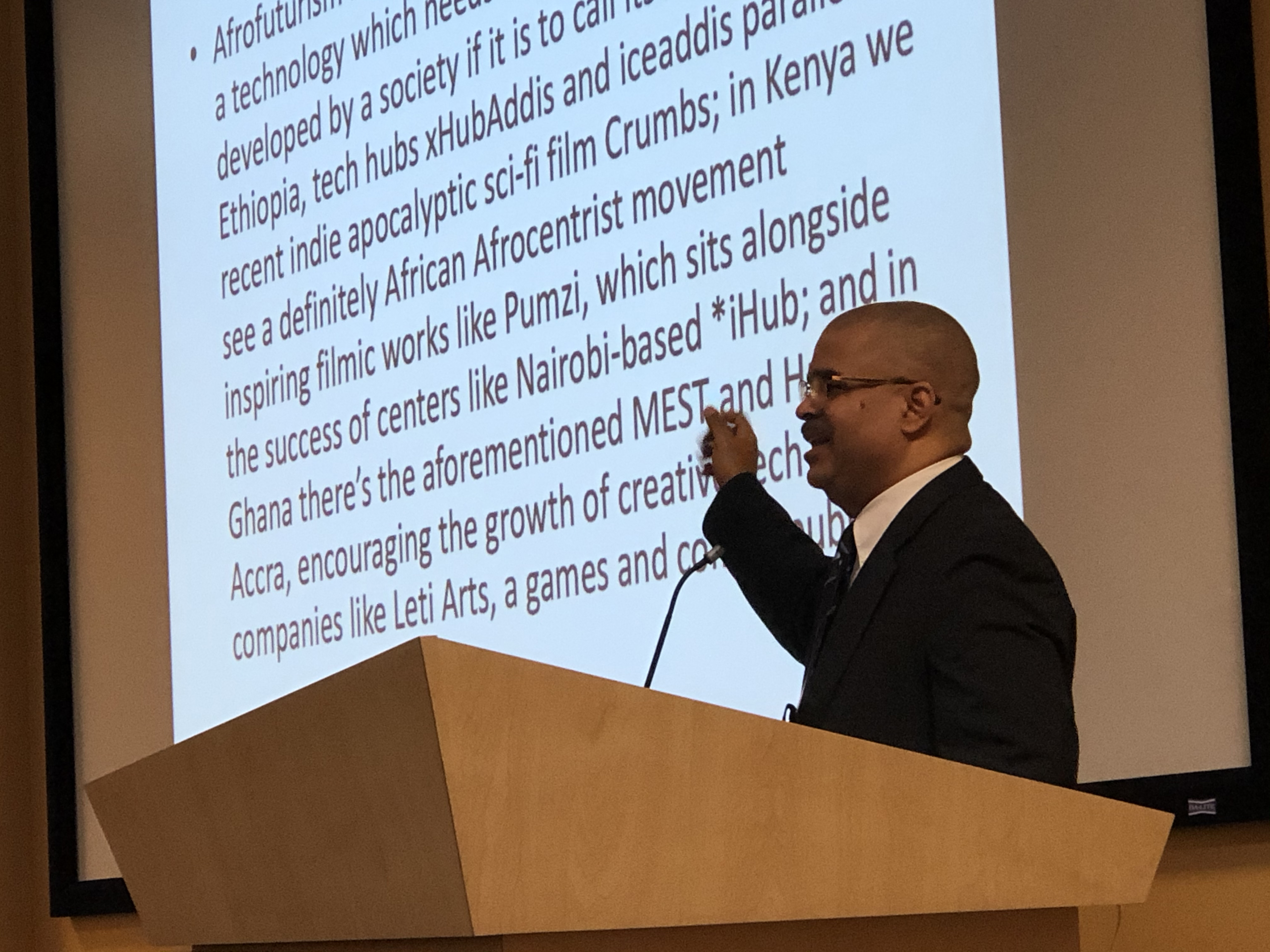2020-2021 Afrofuturism Syllabus - Week 5 - Podcast Interview with Dr. Reynaldo Anderson: The Black Speculative Tradition
Image: Dr. Reynaldo Anderson III delivers his keynote address on "Afrofuturism: The Rise of the Black Speculative Tradition," at the 2020 Afrofuturism Conference on Jan. 30, 2020. Image credit: Scot French.
Welcome to Week 5 of the ZORA! Festival 2020-2021 Afrofuturism Course!
Please begin by reviewing About the Course for an introduction and orientation to the 2020-2021 Afrofuturism Syllabus, which bridges the organizing themes of the first two years of the five-year Afrofuturism Conference Cycle: "What is Afrofuturism?" and "What is the Sound of Afrofuturism?"
Note: Each week the course coordinator will release new content related to the conference themes. Content posted here will remain publicly accessible and may be incorporated into other courses, in part or in full, via links to this site. Suggested citation: French, Scot. Syllabus for ZORA! Festival Afrofuturism Course, University of Central Florida, Orlando, Fall 2020-Spring 2021. STARS, https://stars.library.ucf.edu/afrofuturism_syllabus_about/.
Conversations
In the Conversations segment we share resources featuring participants in the 2020-2021 ZORA! Festival Afrofuturism Conference.
This week’s featured Conversation is a podcast interview with Dr. Reynaldo Anderson, one of the keynote speakers at the 2020 ZORA! Festival Afrofuturism Conference and a leading scholar of Afrofuturism and the Black Speculative Tradition.
Dr. Anderson is an Associate Professor of Communication and Chair of the Humanities Department at Harris-Stowe State University in St. Louis, Missouri. Dr. Anderson publishes extensively in the area of Afrofuturism, communication studies, and the African diaspora experience. He is the executive director and co-founder of the Black Speculative Arts Movement (BSAM), a network of artists, curators, intellectuals, and activists. He is the co-editor of the book Afrofuturism 2.0: The Rise of Astro-Blackness (Rowman & Littlefield, 2015); co-editor of Cosmic Underground: A Grimoire of Black Speculative Discontent (Cedar Grove Publishing, 2018), co-editor of The Black Speculative Art Movement: Black Futurity, Art+Design (Rowman & Littlefield, 2019); and co-editor of Future Movements: Black Lives, Black Politics, Black Futures - An Introduction, a special issue of TOPIA: Canadian Journal of Cultural Studies (2018).
This interview was conducted by Tiffany Pennamon, a Ph.D. candidate in English at the University of Florida, during the ZORA! Festival Afrofuturism Conference on Jan. 30, 2020. It lasts about 50 minutes.
You can find the interview here.

Explorations
In the Explorations segment we pose a series of questions for further investigation and class discussion, based on the featured Conversation. As you listen to the podcast interview with Dr. Anderson, consider the following questions:
- Dr. Anderson argues that Afrofuturism is "a new name for a body of Black Speculative Thought that's been around since the middle of the 19th century." Why is it important to highlight the speculative/imaginative works of early African American writers, such as Martin Delany, Paschal Beverly Randolph, W.E.B. DuBois, and Pauline Hopkins? How does their work pre-figure the Black Arts Movement of the 1960s-70s or the Afrofuturism-themed music, art, and philosophy of our own time?
- What does Dr. Anderson mean by Afrofuturism 2.0? How has the rise of social media platforms created a “new paradigm” for Afrofuturism?
- Dr. Anderson devotes considerable attention to Zora Neale Hurston as a "transitionary" figure in Afrofuturism/Black Speculative Thought. Hurston, he notes, combined the anthropological study of regional black culture with esoteric, occult traditions to create "a universalized cosmic consciousness" for a modern, alienated, post-WWI world -- "a way out of trauma, a way forward." Can you find similar appeals to black vernacular traditions and culture in the work of modern day Afrofuturist writers and artists?
- How would Dr. Anderson respond to those who say Afrofuturism is "too utopian, too idealistic"?
- Martin Robison Delany (1812-1885)
- Paschal Beverly Randolph (1825-1875)
- Pauline Hopkins (1859-1930)
- W.E.B. DuBois (1868-1963)
- John A. Williams - The Man Who Cried I Am (1967)
- Sam Greenlee - The Spook Who Sat by the Door (1969)
- Nettrice Gaskins, digital artist
- Octavia E. Butler (1946-2006), novelist
- Sun Ra (1914-1993), musician
- Marvel Studios' Black Panther (2018)
References
Authors, artists, and works referenced in the podcast include:
Next week: An interview with Dr. Michele Tracy Berger, an award-winning scholar and writer who sheds light on the ways Afrofuturism centers the transformative vision offered by black women.

